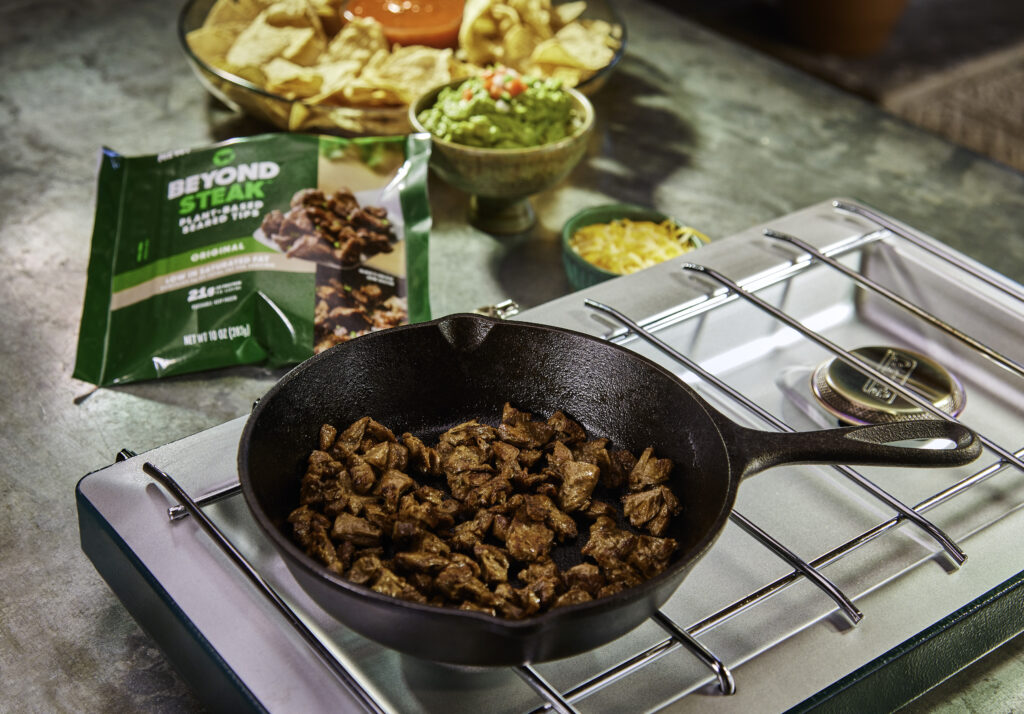Beyond Meat Reports 30% Sales Drop and Cuts 2023 Forecast Amid Waning US Plant-Based Demand
5 Mins Read
Prolonging what CEO Ethan Brown called “the most difficult period” for the plant-based giant, year-on-year sales at Beyond Meat fell by 30.5% to $102M, with a $53.5M net loss. The company has now reduced its full-year revenue forecast and walked back its earlier goal of becoming cashflow-positive in the second half of 2023. Brown ascribed the grim Q2 results to diminishing demand and problematic health perceptions of Beyond’s products.
After entering this year on an optimistic financial note – with its Q1 2023 earnings (while down year-on-year) exceeding Wall Street projections – Beyond had expected sharper revenue growth in the second half of 2023. But it has now reduced its full-year forecast from $375-415M (predicted in Q1) to $360-380M, giving up hope of achieving positive cashflow in the second half.
Beyond cites “greater-than-expected consumer and category headwinds and their anticipated impact on net revenues” as the reason for this. However, the company added it remained “firmly focused on achieving cash flow positive operations, including increased cost containment, and expects meaningfully reduced cash consumption for the balance of the year”.
The alt-meat giant – which laid off 19% of its staff last year – said gross profit was $2.3M in Q2, which meant a gross margin of 2.2%. This is an improvement from the previous year – a $6.2M loss and a negative gross margin of -4.2% – which Beyond attributes to lower materials costs, lower inventory reserves and lower logistics costs per pound. This was partially offset by higher manufacturing costs and lower net revenue per pound, and it represents a decline from the Q1 gross margin of 6.7%.
Beyond hit by fall in consumer demand for plant-based meat

Beyond’s Q2 results come amid a growing decline in demand for plant-based meat alternatives. A new Mintel survey of 1,400 US consumers suggests that only 20% followed a meat-reduced diet this year, with inflation causing 53% of consumers to try fewer new foods like plant-based substitutes. Participants cited taste (48%), nutrition (35%), cost (34%), texture (24%) and processing (21%) as their primary concerns against alt-meat.
It suggests that the category suffers from negative perceptions – reflecting Beyond CEO Brown’s comments on an earnings call to investors, against whom Beyond is facing a class-action lawsuit. “There is a considerable gap between the strong health credentials of our products and a broader counternarrative that is now afoot, and this gap appears to have widened,” he said, as reported by AgFunderNews.
“As was the case during the ascent of plant-based milk, this change in perception is not without encouragement from interest groups, who have succeeded in seeding doubt and fear around the ingredients and processes we use to create our and other plant-based meats,” he added. “Nor is it without contribution from well-meaning yet misguided comparisons of our products to kale salads, versus the animal-based meats they are intended to replace.”
He pointed to the company’s new There’s Goodness Here ad campaign, which subtly responds to years of targeted ads by meat industry interest groups against plant-based meat. The new ads highlight alt-meat’s positive impact on the environment, water and land use, energy footprint, as well as health and farmers. They also focus on a reduced ingredient list for the Beyond Steak, which is also the first meat product – animal- or plant-based – to be certified by the American Heart Association.
The aim is to alter consumer perceptions shaped by coordinated negative messaging against plant-based meat. It also keys into what people want: the Mintel report found that 30% of flexitarians avoid vegan meat alternatives because they are overproduced.
“If you look at Beyond Steak,” said Brown, “it’s absolutely delicious – you have such high levels of protein and a gram of saturated fat… Those things matter when the consumer is willing to come in. But if there’s a kind of cloud over the sector, those things matter less. So our number one goal is to lift that cloud.”
The Europe-US perception divide

Beyond’s international retail revenue was down by 15.6% year-on-year, while foodservice sales saw a more modest decline of 0.9%. But in the US – its home market – retail sales fell by 38.5%, while foodservice saw an even larger drop of 45.4% in the same period. Brown alluded to the differences in consumer perception between the US and Europe: “Consumers are very concerned about climate and the environment in Europe, government is concerned about it, and institutions are concerned about it.”
But in the US, plant-based food consumption is “more driven by health”, and there’s been a decline in the health perception of this sector. He cited a Food Marketing Institute study that found 50% of Americans believed plant-based meats were healthy in 2020, compared to just 38% in 2022. This echoes a 2023 Newsweek poll that showed 40% of Americans don’t believe eating less would help lower carbon emissions, which is in contrast to research that shows a vegan diet can cut emissions by 75% compared to a meat-heavy diet. “We now have to do the heavy work as an industry to fix that.”
He pointed to the “clear nutritional advantages” of Beyond Steak and other products compared to conventional meat. These include “no cholesterol, lower levels of saturated fats, the absence of antibiotics, hormones, and other veterinary drugs, the absence of carcinogenic compounds such as heterocyclic amines, and the absence of precursors to TMAO, a compound that researchers have associated with heart disease and certain cancers”.
Ethan noted that “while older people aren’t necessarily wrapping their minds” around their food’s impact on the climate, younger Americans are. He referenced how 44% of US foodservice provider Aramark’s residential dining menus at 250+ colleges and universities will be plant-based, while Sodexo’s commitment to make 50% of its college campus menus plant-based by 2025. “So the trend really is here.”
And it’s what keeps Brown optimistic. Despite Beyond Meat’s decline in year-on-year sales, quarterly revenue actually increased by 11%, ending a five-quarter streak of continuous revenue decline. Referring to the cut in its full-year revenue forecast, the CEO said: “We nevertheless expect a modest return to year-over-year top-line growth in the third and fourth quarters of 2023, and – relative to the first half of 2023 – a meaningful reduction in cash consumption and an increase in gross margin.”
While the plant-based industry has faced a slump, cost plays a big part. Like many branded products, Beyond’s alternatives are relatively expensive. A 2023 Kantar report suggests that while plant-based food brands have seen a 10% drop in sales, private-label supermarket offerings have grown by 14% in the last year. And reaching price parity with the conventional products Beyond Meat replaces is one of its top priorities in the coming months.



